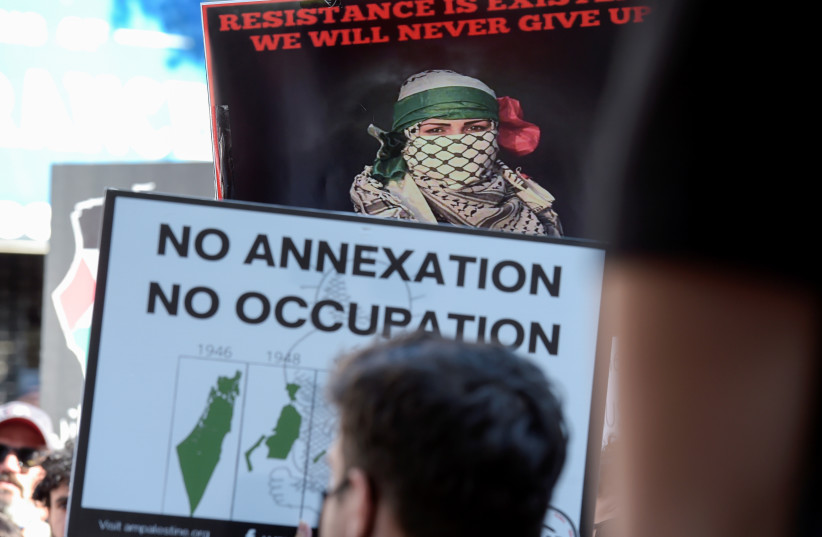The destructiveness, extremism, and damage caused by this “full right-wing government” have not only brought hundreds of thousands of citizens out to the streets; they have also begun to create a change in the liberal camp’s discourse. No more self-flagellation and drifting along with delegitimization led by right-wing propagandists against concepts, personalities, and organizations.
There is much more acceptance and recognition of the importance of cooperation between all parts of the liberal camp, although even now – at least in the context of Arab society and understanding the contradiction between democracy and the situation in the occupied territories – there is still much room for progress.
One of the direct benefits of this change is the return of the word “occupation” to our discourse, a word that over the years has almost turned into a mockery.
The term is making a comeback
The term is making a comeback, with the understanding that the occupation is not only harming the Palestinians and the Israeli soldiers sent to enforce it, but that its methods are slowly creeping into Israeli society and its law enforcement mechanisms.

T-shirts and signs with “No democracy with occupation” have become common at protest events. Members of the “anti-occupation bloc,” once outside the camp, are now attracting more and more activists and demonstrators.
Even the masses who do not connect with the message realize that it is an integral part of the same protest in which they are participating. On the main stage at the Kaplan demonstration last Saturday we finally heard a link between the struggle against the judicial overhaul and the struggle against Jewish supremacy and pogroms perpetrated by Jewish fascists, which had previously gotten yawns from centrists.
As CEO of J Street Israel, I have had the privilege of experiencing this welcome change, which has had an impact far beyond the circle of protest supporters.
When Diaspora Affairs Minister Amichai Chikli appeared on Ayala Hasson’s Kan 11 TV show and called J Street a “hostile organization,” he expected wall-to-wall support, because what could be more popular than bashing leftists, but to his surprise and our delight, the exact opposite happened.
Participants on the panel, including the interviewer, were quick to prove him wrong, adding that J Street is an important Diaspora organization whose representatives are worthy of meetings. But the greatest contribution of Chikli’s ignorance and his attempt to harm us was that it led many representatives of the political center, politicians, and journalists, to defend our organization and its place as an important pro-Israel organization, even if they do not agree with all of our actions.
Suddenly it became clear that the conditioned reflex of the Israeli center to align itself with right-wing incitement, as it did in the past with respect to Breaking the Silence or the New Israel Fund, has been undermined.
There is also a paradigm shift among world Jewry. The tendency to align with Israeli governments regardless of the values they represent – though often contrary to those of many Diaspora Jews – is being undermined. More and more people are realizing that it is possible to be a pro-Israel Zionist even when they oppose and criticize the government, just like those Israeli patriots who are fighting a government that is trying to destroy our democracy and the rights of individuals and minorities.
We must continue to fight against all those attempts on the Right to delegitimize anyone who seeks to talk about the occupation and acts to end it. As the judicial overhaul aggressively attacks the rights of individuals and minorities, the main challenge now facing us is the Education Ministry’s attempt to deny the Israeli-Palestinian Bereaved Families Forum the right to conduct activities in the education system as part of its GEFEN (Hebrew acronym for Flexible Pedagogical Management) programs.
A strong and confident voice must rise up in the face of thugs such as MK Almog Cohen who threatens to “blow up” camps of the Bereaved Families Forum and in the face of Education Minister Yoav Kisch who seeks to get rid of partnership and coexistence content while promoting hateful anti-LGBTQ content and content delegitimizing members of the government and even encouraging pogroms perpetrated by fascist Jews. That voice needs to be heard not just from the Left, but from all elements of opposition and protest.
It must be a voice that is not afraid of labels or of smear campaigns and delegitimization from the Right and that fights for the right to see the other side as human beings – for the sake of ending the occupation and for the sake of strengthening Israeli democracy that the occupation has seeped into, and that could lead to its loss.
The writer is CEO in Israel of the American pro-Israeli lobby J Street, a former diplomat in the Israeli missions in Washington and Boston, and political adviser to the Israeli president.
